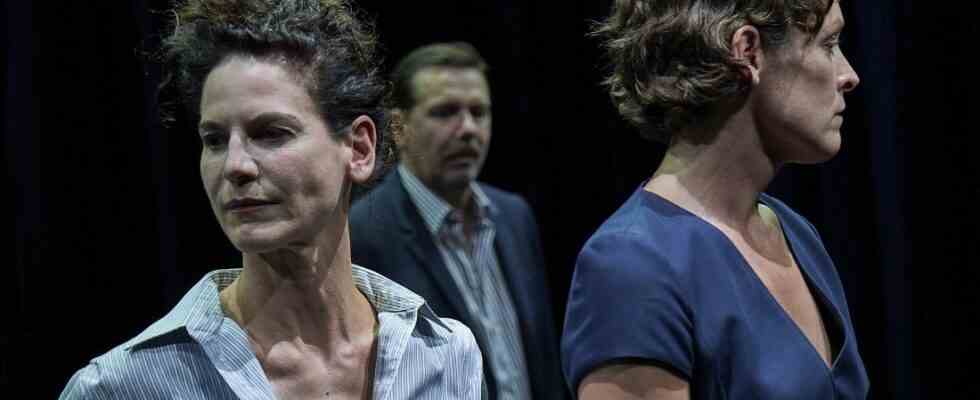Even before the first word has fallen on the playing surface of the Bochum Centennial Hall, the life cycle of various insects is explained in the murmuring style of the Deutschlandfunk program “Sternzeit”. They brood on dead bodies while a funeral procession passes behind the translucent blue curtain. The director Barbara Frey has decided to produce Arthur Schnitzler’s play “The Wide Country” from 1910 for the Ruhrtriennale and the Burgtheater in Vienna. It seems as if the protagonists of this cleverest play about extramarital affairs ever written in German were condemned to a self-chosen grave existence in Bochum from the start.
There, in the Centennial Hall, a desaturated panorama of affairs unfolds in which the lightbulb manufacturer Friedrich Hofreiter, his wife Genia, the ensign Otto Aigner, the young Erna and many others get tangled up on a playing surface equipped with only three club chairs. Hofreiter has just ended an affair, a friend has taken his own life, apparently out of disappointed love for Hofreiter’s wife, which Friedrich openly accuses his wife of, only to throw himself into the next affair immediately afterwards. In the end, nobody will be happier, but another person will be dead.
In this constellation, it seems reasonable to expose Hofreiter to ridicule as a villain who cannot control his impulses. But Frey takes Friedrich’s remark, which at first glance seems platitude-like, seriously that life is “already a complicated arrangement”. One never has the feeling that the figure follows that immature principle of pleasure that Schnitzler’s women (certainly not wrongly) attribute to men as the purpose in life. No, this stiff man with his shoulders slumped and his mezza voce-Self-justification is caught in an unhappy lack of freedom, helpless and helpless in the face of one’s own ultimately fatal actions.
The ensemble of the Vienna Burgtheater is on stage in this co-production with the Ruhrtriennale in Bochum.
(Photo: Matthias Horn, Ruhrtriennale 2022)
Michael Martens turns the man, who is sometimes doubtful, sometimes determined, but always unsuccessful in attempting to break out of the grave, into a person looking for direction. His court rider evokes a kind of sympathy even when he applies double standards to himself and others, when he tries to exculpate himself with attacks of jealousy towards his wife, when in a surprising outburst he demands an “unconditional yes” from his new lover Erna, only to insist he “belongs to no one in the world”. A spectator of one’s life is this sad fellow, unable or unwilling to understand or change what he is observing.
The “honesty to the point of orgy” demanded by his friend, the ever-lonely Doctor Mauer – an Itay Tiran acting with fruitless decency – poses the greatest threat in a world where people are no more persistent in deceiving than themselves.
The only exception is a divorced couple. Casting the roles of Frau Meinhold-Aigner and Doctor Aigner, who is separated from her, with the same actress has proven to be a particularly clever and convincing decision. Bibiana Beglau. Doctor Aigner confessed his affair to his wife, and she ended the marriage: “The fact that I loved her so much and was still able to cheat on her made her mad at me and at the whole world. Now there was no longer any security at all on earth, no possibility of trust.”
No orgies, but fear of real, irreversible change
Now both parts of this formerly indissoluble connection live apart like a broken apart platonic spherical man. Beglau makes the female part softer and more insightful than the male, but she lets both appear as complementary principles that have failed due to the breach of principle, too high expectations and uncompromisingness.
Breakthrough, but why? Stage design with tunnel boring machine in Barbara Frey’s Schnitzler production.
(Photo: Matthias Horn, Ruhrtriennale 2022)
The insincerity of the other characters creates a great tension between the openness with which affairs are discussed and the inconsistency of “keep it up” with which action is taken in full knowledge of the infidelity. Orgies are not to be expected here. Rather, the disciplined, restrained ensemble effectively creates an atmosphere of fear of real, irreversible change in the actually unbearable conditions.
This also applies to Hofreiter’s wife Genia, who is at least aware of this inconsistency. Katharina Lorenz sits frozen in her armchair and speculates whether it is a sign of a lack of love when she forgives her husband for his antics: “Maybe it’s the higher kind of love that Not Forgive me.” The fact that she, who didn’t want to repay like with like for so long, finally throws herself into an affair of her own with Felix Kammerer’s awkward, boyish Otto acts as a kind of relief for her husband, who she frees from the burden of one-sided infidelity It will cost Otto his life in an absurdly unnecessary duel with Friedrich.
When the curtain opens at the end and the huge head of a tunnel boring machine appears, this could suggest an opening of the graves, a breakthrough to freedom. But also the final destruction of what was. The rigidity in the status quo, the quest for human rapprochement, and the minefield of sincerity and secrecy that is marriage have never been more poignantly portrayed in dialogue than in this drama. Frey’s congenial production shows that, by refusing to provide definitive answers, it is more timely than ever in a world of ubiquitous quick judgment.

